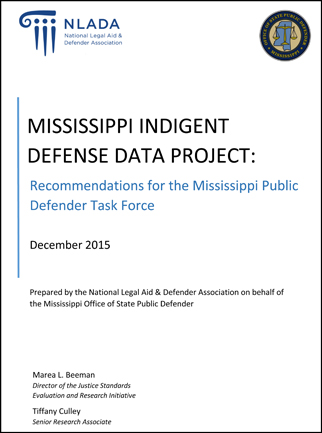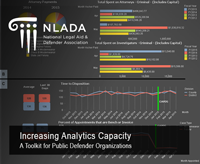 In December 2015 NLADA presented a report to the Mississippi Public Defender Task Force to help it and the Mississippi Office the State Public Defender (OSPD) acquire data they both need to carry out statutory requirements to advise the state legislature on needs for indigent defense in the state.
In December 2015 NLADA presented a report to the Mississippi Public Defender Task Force to help it and the Mississippi Office the State Public Defender (OSPD) acquire data they both need to carry out statutory requirements to advise the state legislature on needs for indigent defense in the state.
Created in 2011, the OSPD is expected to “coordinate the collection and dissemination of statistical data” and to “develop plans and proposals for further development of a statewide public defender system in coordination with the Mississippi Public Defender Task Force.” Meanwhile the Task Force, which comprises 13 designated members, is expected to “[m]ake a comprehensive study of the needs by circuit court districts for state-supported indigent defense counsel to examine existing public defender programs” and report to the state legislature each year.
It is currently difficult for the OSPD and Task Force to carry out their data collection and planning responsibilities. In Mississippi, implementation of the right to counsel is primarily a local responsibility. For non-capital, trial level cases, Mississippi’s 82 counties and multiple localities have the responsibility to select the type of delivery system used, determine the amount of funding required, and appropriate necessary funds. Counties have implemented an array of service models to provide indigent defense representation, including assigned counsel, contract public defenders, full-time salaried public defender offices, and part-time salaried public defenders.
In this highly de-centralized structure, counties and providers of indigent defense services are under no obligation to collect and report information on indigent defense activities or funding. Data that are collected are not tracked in a uniform fashion. As a result, it is impossible to get an accurate statewide picture of indigent defense resource needs.
NLADA’s report, Mississippi Indigent Defense Data Project: Recommendations for the Mississippi Public Defender Task Force, sets out a data collection methodology for the OSPD to gather basic indigent defense information, which can then inform its recommendations to state legislators for systematizing statewide data collection.


